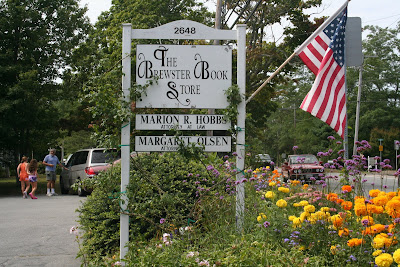
I ended my summer reading Annie Dillard’s
The Maytrees: A Novel on a beach in Cape Cod, which happens to be where the novel is set. I love that experience—reading about the place you’re visiting, while you’re there. That kind of reading experience can really open my eyes to a new place, making me seek out details about the place that the writer mentions, and generally enhancing my visit. This, of course, is only if the book is good.
Fortunately,
The Maytrees is good.
The Maytrees is the story of the relationship between Toby Maytree and the woman he marries, Lou Bigelow. Toby is a poet whose output is small but serious, and who works in construction when he isn’t writing. Lou paints, and reads, and leads a simple, ascetic, nearly silent, life.
They are part of a bohemian group of artists and intellectuals who live in a strange place, the tip of Cape Cod, a spit of land thrusting into the Atlantic Ocean, surrounded by sand, sea and sky in a way that few other places are.
I love that Dillard has set the book in this place. Some might call it godforsaken--it is certainly off the beaten track--the parabolic dunes she writes of, which have been sculpted by powerful winds, look like a lunar, not an earthly, landscape. This spare yet beautiful setting perfectly match Dillard’s simple story and spare yet beautiful prose.
Before
The Maytrees, the work of Annie Dillard’s that I had read, and was enchanted by, was non-fiction, but it had the same lyrical language, and the same fascination with the physical world. In
An American Childhood and
Pilgrim at Tinker Creek, it is clear that she is inseparable from her interaction with the physical world—it makes her who she is. In
The Maytrees, she writes poetically and profoundly about the setting, the dunes of Provincetown, the vast ocean, the creatures who live in or near it, the night sky above it.
It did not surprise me when I found out that Dillard wrote her masters thesis on Thoreau’s
Walden, focusing on the use of Walden Pond as “the central image and focal point for Thoreau's narrative movement between heaven and earth." In this book she seamlessly integrates the natural world with the characters’ emotional worlds—they are inextricable.
Together Toby and Lou have a son, Pete, who grows into more of a local than his parents, becoming a fisherman. Accidents, betrayals, and other loves intrude on Toby and Lou’s marriage. Without being a spoiler, I’ll say that in the end, Lou makes an inspired and saintly yet unsentimental choice out of love, which serves as proof of her personal growth throughout the story.
To my mind, Lou Maytree is really the main character of the book. I didn’t realize it while I was reading, but later thought that she reminded me of a nun or a monk, with her simple life, her silence, her singlemindedness. Then I realized that she was on a spiritual path, though a non-religious one. One of the novel’s main themes is maturation—in both the physical sense, as in the aging (and eventual death) of the body, and in the emotional, psychological and spiritual sense, as in the growth of a human being. At a certain point in the story, when she feels she needs to “let go”, Lou practices detachment, she learns self-mastery. But:
It took her months to learn that she could get clean for more than a minute at a time. Consciously she looked out for resentment, self-cherishing, and envy. Over years she formed the habit of deflecting them before they dug in.
Later Lou muses:
Could a person hold all people past and present in awareness? She further wondered if doing so was, by some errant chance, the point—toward what end she had no clue. Not that life required a point. But she found herself starting to sway toward eventually considering that there might be one. A point. Any point.
I love Lou’s journey, her mode of thinking, her ruminations.
Here is Lou on what living on Cape Cod does to people, making them eccentric:
Lou asked herself, yet again, What happens to people out here on the lower Cape, a mid-ocean sandspit, what happens even to intelligent and educated people, that they take to plying skies like cows in Chagall? From solid citizens they sublimed to limbless metaphysicians. Their minds grew lucent as gels. Or they slipped from supersaturation to superstition without passing through crystal. Lou decided that the lower Cape’s ratio of gases and fluids to solids must be out of whack.
The other characters are eccentric, mostly privileged, arty people, not always easy to relate to, but Dillard makes them entertaining. They have names like Reevadare Weaver, Cornelius Blue, Jane Cairo, Deary Hightoe. Dillard shows Reevadare getting more eccentric as she gets older:
--You look wonderful, Jane told Reevadare. Reevadare’s humpback, which she named Surtsey, was now almost higher than her head.
--Honey, I got enough troubles without looking good. Reevadare never used to call people honey. She was playing old age like a bass.
There are so many clever bits, so many gorgeous passages, so many beautifully crafted sentences, that I’d almost have to quote the whole book to do it justice. The writing has been described as spare, but it’s not just spare, it’s compact—it packs meaning into few words. You cannot read it quickly—but you don’t want to, either.
If you are someone who needs a really strong plot, this might not be the novel for you. Though the story heats up a little near the end, it is not a plot-driven book. But if you are in love with language, and want to see what a real stylist can do, you should give this a read.














































